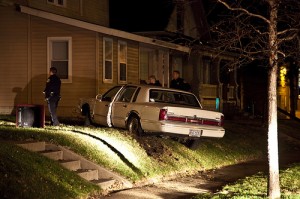 Drunk driving fatalities increased in 2012 over 4% across the U.S., according to a recent MADD study. The same study cites 35% of fatalities in 2012 attributable to alcohol related causes. The loss of life, property, and a clean criminal record should deter any reasonable person from driving above the legal alcohol limit, but unfortunately, it does not stop new occurrences.
Drunk driving fatalities increased in 2012 over 4% across the U.S., according to a recent MADD study. The same study cites 35% of fatalities in 2012 attributable to alcohol related causes. The loss of life, property, and a clean criminal record should deter any reasonable person from driving above the legal alcohol limit, but unfortunately, it does not stop new occurrences.
In August 2012, St. Louis City Alderman, Gregory Carter, 54, was struck and killed by an intoxicated driver. The driver has recently pleaded guilty to charges in Mr. Carter’s death. In exchange for the guilty plea, “Patrick Mullen, 26, was given a suspended jail term and sentenced to two years probation. He will also undergo treatment for alcohol abuse and be forced to use an ignition interlock device on his car. A court order forbids him from purchasing, possessing or drinking any alcohol.”
One might wonder how the sentence forbidding the driver, Mr. Mullen, from purchasing alcohol might be enforced. While the terms of his probation and punishment would be handled by the penal system, including police and probation officers, it is possible that the establishment selling alcohol to this person could also be held responsible for any harm caused following intoxicated reckless driving.
The laws covering personal injury liability following the actions of a negligent, intoxicated driver are known broadly as “vicarious liability,” and “dram shop” laws. These laws refer to a situation where a person “knowingly served intoxicating liquor to a visibly intoxicated person.”
The law does not hold liable the service to a person who does not appear clearly intoxicated. In the case of a person asking for alcohol while also serving probation (like in the story above) the law would not automatically attach liability to the server.
Proving “visible intoxication” requires careful analysis of the facts of the situation–were there witnesses who can testify? If you believe you have been affected by the negligent or reckless actions of an intoxicated driver, your remedies include seeking redress through civil damages.
Speak to an experienced personal injury about the situation you face, especially if you suspect that the driver was served too much alcohol at a public establishment.

